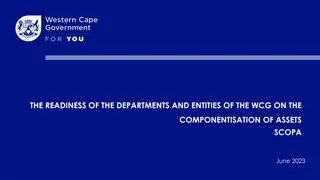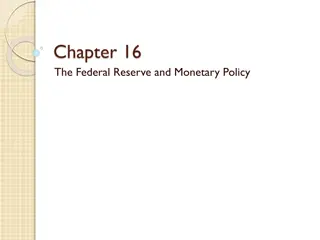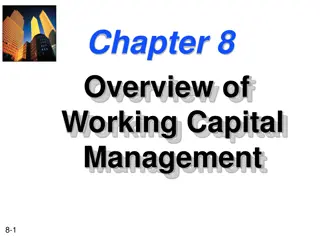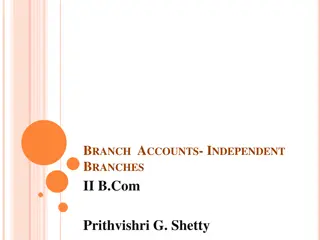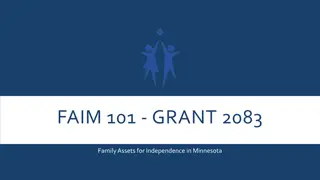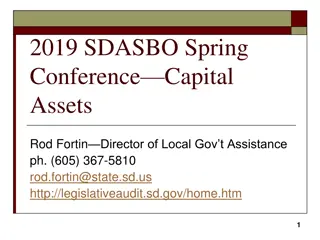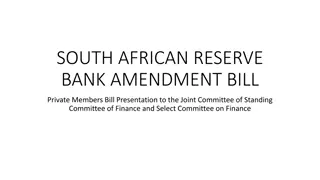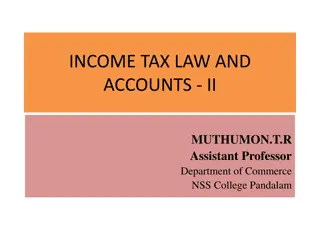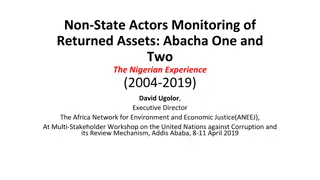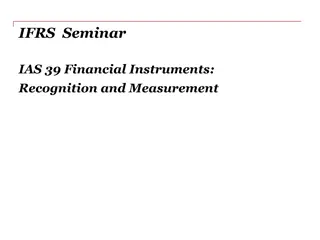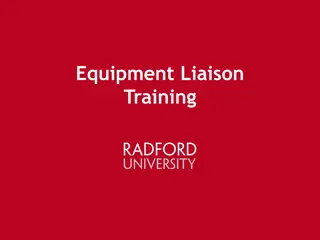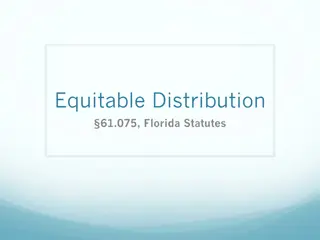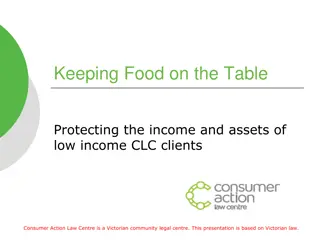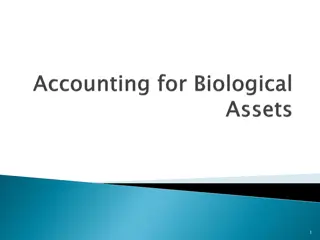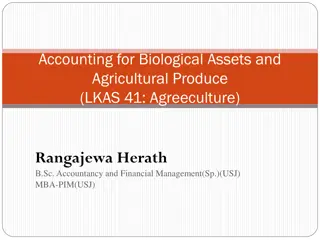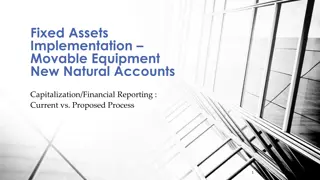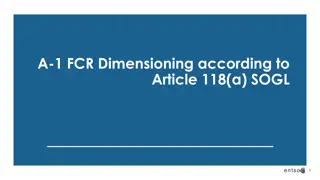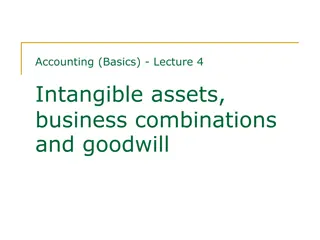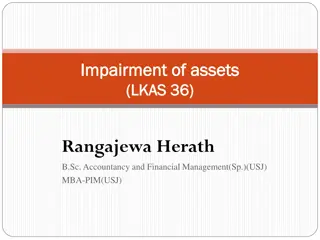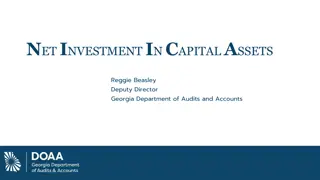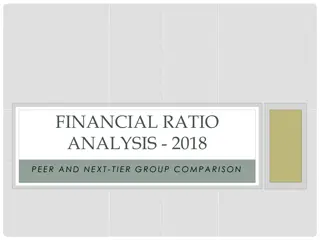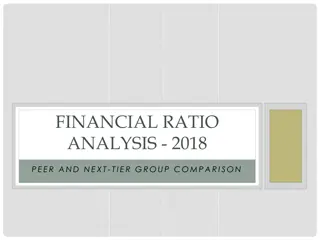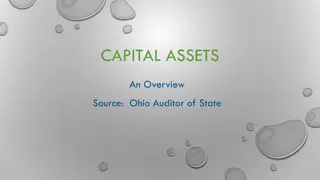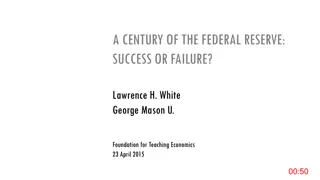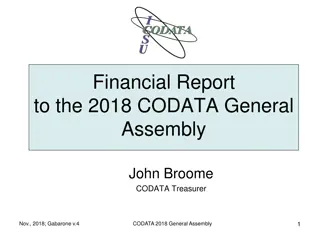Componentisation of Assets: Readiness and Overview for SCOPA June 2023
The readiness of departments and entities within the WCG on the componentisation of assets is discussed along with an overview. Componentisation involves breaking down significant parts of assets into individually identifiable parts with different useful lives. Advantages include accurate tracking o
0 views • 7 slides
Understanding the Federal Reserve System and Monetary Policy
Delve into the history, structure, and functions of the Federal Reserve System, including its role in implementing monetary policy to stabilize the economy. Explore the establishment of the Federal Reserve Act of 1913, the structure of the Federal Reserve, and its pivotal role in serving the governm
0 views • 35 slides
Understanding International Inheritance Tax Rules
In the realm of international property and succession law, different legal systems like Common Law and Civil Law govern how inheritance tax applies to individuals with assets in multiple countries. For French residents, navigating French succession tax on worldwide assets is crucial, while non-Frenc
2 views • 27 slides
Understanding Fractional Reserve Banking Through Multiple-Choice Questions
Test your knowledge of fractional reserve banking with a series of questions covering topics such as its history, profit mechanisms for banks, the money supply, reserve requirements, excess reserves, and the impact of reserve ratio changes on the money supply. Explore concepts related to commercial
1 views • 12 slides
Overview of Working Capital Management in Financial Management
Working capital management involves strategic decision-making regarding a company's current assets and liabilities to optimize liquidity, profitability, and risk. This process includes understanding working capital concepts, financing current assets, managing liability structure, and maintaining the
1 views • 26 slides
Understanding Independent Branches in Accounting
Independent branches in accounting operate autonomously, making purchases externally, receiving goods from the head office, setting their selling prices, and managing expenses from their own cash flow. They keep complete books, prepare financial statements independently, and may engage in inter-bran
1 views • 10 slides
University of Idaho Asset Management Overview
Asset management at the University of Idaho involves the strategic management of equipment assets to safeguard investments, comply with regulations, and facilitate cost recovery. The objectives focus on enhancing asset monitoring, accuracy of inventory records, personnel training, and adherence to p
0 views • 14 slides
Family Assets for Independence in Minnesota (FAIM) Program Overview
The Family Assets for Independence in Minnesota (FAIM) program helps individuals achieve financial independence through a structured process involving eligibility criteria, opening a savings account, financial coaching, obtaining assets, and closing the account. Eligibility requirements include inco
0 views • 25 slides
Understanding Capital Assets and Financial Reporting
This presentation delves into the world of capital assets, focusing on their categorization, ownership, and reporting in financial statements. Key topics include the distinction between tangible and intangible assets, responsible asset management, and the implications of capital leases on ownership.
0 views • 61 slides
New Accession Training (NAT) & The Navy Reserve Program Details
Program Requirements designed to address critical Navy Selected Reserve manning shortfalls, including training pipeline details, drill pay structure, Montgomery GI Bill benefits, and Post 9/11 GI Bill qualification criteria for Reservists. The program aims to provide comprehensive training and benef
0 views • 27 slides
Presentation of South African Reserve Bank Amendment Bill to Joint Committee
The Economic Freedom Fighters (EFF) presented the South African Reserve Bank Amendment Bill to amend the current ownership structure allowing private individuals, including foreigners, to own shares in the South African Reserve Bank. The presentation emphasizes the need for legislative actions withi
0 views • 19 slides
Capital Gains and Assets Overview in Income Tax Law and Accounts
This content provides an overview of capital gains and assets in income tax law and accounts, covering topics such as types of capital assets, assets not considered capital assets, kinds of capital assets (short-term and long-term), transfer year of chargeability, computation of capital gains, and c
0 views • 15 slides
Monitoring of Returned Assets: Abacha's Legacy in Nigeria
International efforts led by civil society in Nigeria and Switzerland have successfully monitored the return of assets linked to the Abacha regime. Initiatives like the Nigerian Network on Stolen Assets and the Conditional Cash Transfer program demonstrate transparency and accountability in handling
0 views • 10 slides
Understanding IAS 39: Financial Instruments Recognition and Measurement
This content provides an overview of an IFRS seminar on IAS 39, focusing on key concepts such as the classification and measurement of financial assets, impairment, reclassification, and more. It covers definitions of financial instruments, financial assets, equity instruments, and financial liabili
1 views • 43 slides
Understanding Liquidation Estate and Key Asset Components
In the process of liquidation, the liquidator forms an estate comprising various assets of the corporate debtor for the benefit of creditors. These assets include ownership rights, tangible and intangible assets, proceeds of liquidation, and more. However, certain assets owned by third parties or he
0 views • 39 slides
University Asset Management Guidelines
University asset management guidelines cover the physical inventory policy, procedures, and fixed asset terminology for safeguarding, tracking, and reporting assets. Departments designate equipment liaisons to manage assets and conduct physical inventories regularly. Assets are categorized as capita
1 views • 21 slides
National Food Reserve Agency (NFRA): Enhancing Food Security in Nigeria
The National Food Reserve Agency (NFRA) under the Federal Ministry of Agriculture & Water Resources plays a crucial role in addressing agricultural production, storage, and marketing challenges in Nigeria. With a vision to ensure sustainable food access for all Nigerians and become a global food pro
1 views • 30 slides
A Comparison of ELI and UNIDROIT Principles on Digital Assets
A comparison between the principles of Electronic Liability Initiative (ELI) and the International Institute for the Unification of Private Law (UNIDROIT) regarding digital assets. ELI focuses on security over digital assets, while UNIDROIT covers a broader range, including transfers, custody, and m
0 views • 5 slides
The Legend of Sherwood Forest: From Royal Hunting Reserve to Nature Reserve
Sherwood Forest, once a royal hunting reserve in the 10th Century, is renowned for its association with the legendary figure Robin Hood. The forest provided cover for both hunting and outlaws, eventually becoming a nature reserve attracting millions of visitors annually. Despite its reduced size fro
0 views • 9 slides
Understanding Equitable Distribution in Florida
Equitable distribution in Florida, governed by statutes 61.075 and 61.076, determines the fair division of marital assets and liabilities in divorce cases. Key considerations include identification, valuation, distribution presumption, and justification for unequal distribution. Assets are classifie
0 views • 28 slides
Managing Debt and Protecting Client Assets in Victoria
Consumer Action Law Centre in Victoria focuses on assisting low-income clients in managing debt and protecting their assets. The presentation emphasizes assessing the need for debt payment, considering the client's financial position, and exploring options to handle debt where income and assets are
1 views • 29 slides
Understanding Society: Wealth and Assets Survey Research
The Wealth and Assets Survey (WAS) conducted by Oliver Tatum and Angie Osborn at the Understanding Society Research Conference in 2013 focuses on longitudinal issues, experiment design, research findings, and future plans related to the survey. The WAS background includes collecting data on personal
3 views • 28 slides
Accounting for Biological Assets and Agricultural Produce
At the end of this lesson, you will be able to identify the principal issues in accounting for biological assets and agricultural produce at the time of harvest. Topics include the recognition, measurement, presentation, and disclosure of biological assets in financial statements. Questions regardin
0 views • 26 slides
Accounting for Biological Assets and Agricultural Produce (LKAS 41: Agriculture) by Rangajewa Herath
This content provides insights into the accounting standards for biological assets and agricultural produce under LKAS 41, discussing classification, presentation, measurement, gain or loss recognition, and disclosure requirements. It covers the unique nature of biological assets, the scope of LKAS
0 views • 20 slides
Comprehensive Fixed Assets Management Guidelines for Educational Institutions
Explore a detailed guide on tracking and recording fixed assets in educational institutions, covering key aspects such as capital assets accounting procedures, general ledger accounts, and the definition of capital assets. Learn the minimum standards for valuing assets, recording guidelines, and the
0 views • 25 slides
Proposed Process Improvements for Fixed Assets Management
Implementing Oracle Fixed Assets for managing fixed assets and capital projects, the proposed process aims to streamline capitalization, improve financial reporting controls, and enhance operational efficiencies. By organizing accounts based on asset categories, tracking ownership, and providing det
0 views • 9 slides
FCR Dimensioning Rules Proposal for Synchronous Area Operational Agreements
Article 118 of the Synchronous Operational Agreements introduces rules for the dimensioning of Frequency Containment Reserve (FCR). The proposal requires TSOs to jointly develop guidelines for FCR dimensioning, including annual reserve capacity determination and initial obligations. Specific criteri
0 views • 16 slides
Understanding Flight Attendant Reserve Rotation Process
Explore the basics of reserve rotation for flight attendants, including how to determine if you are on reserve, the impact of senior bump, and details of the rotational schedule for different years of service. Learn about when you will need to serve reserve, how the reserve list is generated, and ho
0 views • 12 slides
Understanding Intangible Assets and Business Combinations in Accounting
In accounting, recognition of intangible assets as assets requires the expectation of future economic benefits flowing to the entity and reliable measurement of the asset's cost. Intangible assets acquired separately are recognized based on their fair value, while those acquired in business combinat
0 views • 23 slides
Understanding Impairment of Assets in Financial Management
Entities must periodically test for impairment to ensure assets are not overstated. An impairment loss occurs when an asset's carrying amount exceeds its recoverable amount. Assets like inventories and deferred tax assets may require testing. Learn when to undertake impairment tests, key indicators,
0 views • 19 slides
Understanding Net Investment in Capital Assets and Its Importance
Net Investment in Capital Assets is a critical component of an entity's financial position, reflecting the value of capital assets owned. It represents the portion of the net position that is not spendable as it is invested in assets. Calculating Net Investment in Capital Assets involves subtracting
1 views • 17 slides
Understanding Net Worth: Integers and Financial Assets
Learn about net worth, liabilities, and assets by exploring how integers are used to determine the financial standing of individuals. Discover the concepts of liabilities, responsibilities, and assets through real-life examples of notable personalities. Dive into calculations and understand how net
0 views • 18 slides
Financial Ratio Analysis 2018 Peer and Next-Tier Group Comparison
This financial ratio analysis for 2018 compares the viability ratios and primary reserve ratios of various institutions within the peer and next-tier groups. The Viability Ratio assesses an institution's ability to cover its long-term debt with expendable net assets, while the Primary Reserve Ratio
0 views • 15 slides
Comparative Financial Ratio Analysis 2018 for Higher Education Institutions
This analysis compares the Viability Ratio and Primary Reserve Ratio of peer and next-tier higher education institutions in 2018. The Viability Ratio assesses an institution's ability to cover its debt with expendable net assets, while the Primary Reserve Ratio measures how long an institution can o
0 views • 15 slides
Understanding Capital Assets in Financial Reporting
A capital asset is a long-term asset used in operations with a useful life extending beyond a single reporting period, such as land, buildings, and infrastructure. These assets are reported at historical cost, including ancillary charges. Special assets like works of art or historical treasures are
0 views • 35 slides
Understanding Balance Sheets and Income Statements in Financial Reporting
Balance sheets provide a snapshot of a company's assets, liabilities, and shareholders' equity at a specific point in time, with assets listed on the left and liabilities and equity on the right. Current assets are those expected to be converted into cash within a year, while non-current assets are
0 views • 34 slides
Digital Assets and Social Media Estate Planning
Explore the world of digital assets and social media estate planning presented by Patricia E. Kefalas Dudek & Howard H. Collens. Understand what digital assets entail, the categories they fall into, and how to assist clients in planning for their digital legacies. Learn about the importance of estat
0 views • 56 slides
Evolution of the Federal Reserve System: A Century of Impact
Explore the establishment of the Federal Reserve, the role of the central bank in a free-market economy, pre-Fed era panics, policies affecting national banks, reform discussions, and the pivotal Federal Reserve Act of 1913, shaping the financial landscape of the United States.
0 views • 41 slides
Real-Time Co-optimization of Energy & Ancillary Services Demand Curves
Explore the concept of constructing demand curves for Regulation Up Service, Regulation Down Service, and Responsive Reserve Service from the ERCOT public data. Learn about modifying individual AS demand curves and allowing overlaps to enhance co-optimization and efficiency. Dive into an example AS
0 views • 17 slides
Financial Report Summary to 2018 CODATA General Assembly
The financial report presented at the 2018 CODATA General Assembly by John Broome, the CODATA Treasurer, highlighted the 2017 audit results, balance sheet, assets details, reserve fund status, statement of operation from 2015-2017, and dues information. The 2017 balance sheet showed total assets of
0 views • 15 slides
